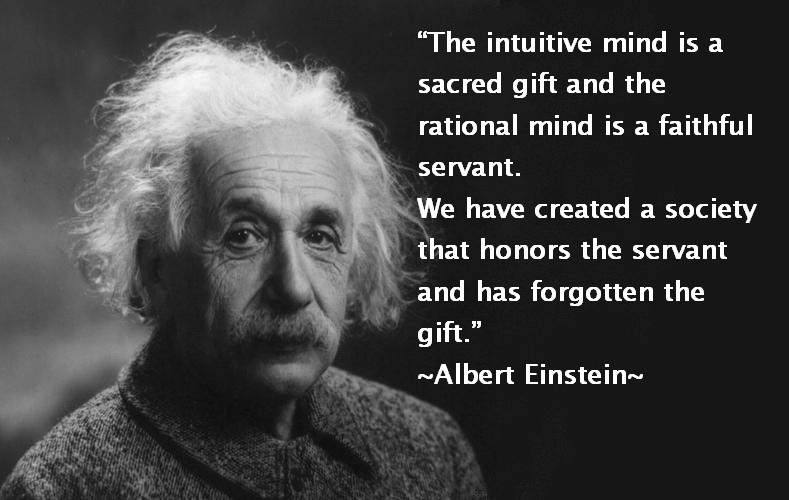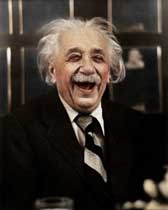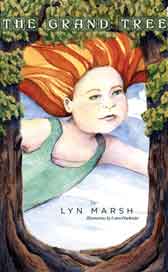Barbara McClintock’s eyes fog over and her body flickers on and off, like an old street light in the wee hours of the morning, just before it gives over to the day. Einstein’s attention moves as a cobra ensnared by a musical reed – in a ritual dance of undulating unwavering focus that seems altered as though concentrated on something that exists somewhere else .
The cosmos releases McClintock from its spellbound embrace and the fog lifts from her eyes. She looks into Einstein’s fixated stare… until it sets him free.
McClintock:
“Before I tell you more about my research, I want to let you know what I remember. As my consciousness moved through my kernel of corn, into the cosmos, two beings came to me and took me into a significant moment in each of their lives. One of them was Emanuel Swedenborg, who described himself as a scientist and mystic in his lifetime. I recognized the other one to have been a poet in my last lifetime – William Blake.”
Einstein:
“Oh my …”
McClintock:
“Swedenborg, the first one, was conversing with a group of angelic beings. As I brushed him with my movement [although I was not moving] in the cosmos, he reached into me with his presence.
“The next instant, I was sitting next to him in his last lifetime, by his deathbed, on March 29th, 1772. He was reminding those around him, that March 29th is the day that he will die [something that he had been repeating to them, for many years]. You could tell that most of them reacted as though he was insanely arrogant.
“He then reminded them that he could directly communicate with the Divine; and he continued on to say that he wrote about this, in his life, so that they could know his experiences, and therefore know more about God.
“A pastor was next to him, reminding him about how people were very critical of him for thinking that he could have his own personal relationship with God. So, he pulled himself up on his hands and said, “As truly as you see me before your eyes, so true is everything that I have written; and I could have said more had it been permitted. When you enter eternity you will see everything, and then you and I shall have much to talk about”.
“He died that same day- the very day that he had been announcing that his death would occur.
“The poet, William Blake, appeared by the bedside of the dying Swedenborg. Blake leaned over his body, and whispered in his ear, that he would receive inspiration from Swedenborg’s life, in the future; he thanked him for this.
“He then turned to me, and told me that he also believed in a mystical world… and in a spirituality that is personal. He communicated that, in his life, he had reached as far as he could imagine… often into places that made those around him uncomfortable. He was mystical and too defiant of their rules of thinking and of living to be directly received by them.
“He told me that he died in poverty, but his lack of monetary success did not separate him from his search for the mystery and secrets of life… of eternity. In the afternoon of his death, he took me into his last of moments, where he burst out- singing of the joy, and of things he was experiencing in ‘heaven’. He lifted out, as he was singing.
“As he was crossing, his soul’s song flowed into my heart and mind…
“To see a World in a Grain of Sand
And a Heaven in a Wild Flower,
Hold Infinity in the palm of your hand
And Eternity in an hour. ” “
Einstein:
“I recall this from a poem by Blake. It was called ‘The Auguries of Innocence’.”
(Einstein took a deep breath and then continued.)
“Perhaps there is a hint about your nature in all of this. They both had a personal relationship with the Divine. You had a personal relationship with nature. And that is a significant part of your personal relationship with the Divine, isn’t it?
“They could see things that others could not yet imagine. Each of them must have experienced pain from this; yet it did not stop them from going forward. And they both contributed something that moved life gently in new directions. Does this remind you of yourself?”
McClintock:
“I am challenged by these exquisite moments with you, Albert… to know more… of the essence of who I am… I believe we are continuing where we left off, in our lives. I could look into the essence of the wonder and beauty of my corn, but I mostly ignored my own.”
<pause>
Einstein:
“You were going to tell me about what you discovered, that took your world 30 plus years to receive.”
McClintock:
“Yes … so I will continue.”
(McClintock grins with the pure innocence of a newborn… and her grin utters Einstein into a utopia of wonder.)
“In embryology, they knew that something could happen in a cell [when it goes through mitosis] that would only show up in the progeny of that cell, many cell generations later. But they didn’t really know what these changes were about.
“One day, one of my cells, from my kernel of corn, formed two sister cells, but the pattern of gene action in these two cells was very different from the mother cell. And not only that, but one of the sister cells gained something, while the other one lost something. I kept thinking to myself, “one cell gained what the other lost”. I spent the next two years exploring what this meant. This was my whole focus. Most people thought I was ‘wasting’ my time.”
Einstein:
“What motivated you most?”
McClintock:
“Well, I didn’t have an answer and I felt such a joy to search for the answer. This was the joy. When you have that joy, you tend to do the right experiments. You let the material guide you where to go, and it tells you at every step what the next has to be. It does this because you are not following an old pattern; and you let yourself focus on something new, not yet known.
“Two years later, I was observing a form of controlled breakage in the chromosome. I saw it! A signal was sent out from somewhere and this resulted in a gene responding to the signal. They would turn on or off from these signals.
“This all happened in the 1940’s. It took me six more years to bring it all together into a final interpretation. My deepest point of reference came from my inner visions and my inner confidence. I was so curious and in a continual state of wonder with peaks of exhilaration.
“I could see genes turn on and off in the chromosomes .. and how they were responding to messages that could have been coming from the cell itself or from the environment. I realized that everything was connected… and interrelated. Nothing operated on its own. Genes would cross over to other chromosomes… even crossing over into chromosomes in DNA in other cells. One cell would gain what the other lost. And this would all be a response to signals sent to the cell from the environment, or to the chromosome from the cell, or from many possible places of origin. This is referred to as ‘transposition’. I called it ‘jumping genes’.
“The amazing thing is that no one at all even conceived that this could exist. Transposition was something that most other researchers could not imagine to be possible. My research was a different language to them. And it felt impossible for me to describe things in a way that they could also see.
“I had been appointed to the Department of Genetics at Cold Spring Harbor, in 1942, which originally was associated with Carnegie Institute. I presented my research in 1951 and again in 1956 at the Cold Spring Harbor Symposium. I was one of the dignitaries in my field before I presented this research. Afterwards, I was thought to be a fool and a mad woman. I stopped talking and basically I stopped publishing, and withdrew further into my work. I protected myself with my ‘inner knowledge’ that I was on the right track. But I was continually wary of hostile colleagues .. and others who came into my lab. I used my quick sharp tongue to protect myself.
“A prominent geneticist referred to me as ‘just an old bag who’d been hanging around Cold Spring Harbor for years’. Another well known geneticist who was a frequent visitor came up to me and said, “Now, I don’t want to hear a thing about what you are doing. It may be interesting, but I understand it’s kind of mad.” I was ridiculed by many. And those rare few who were leaning in my direction, were on different levels of thinking… and we couldn’t really communicate well.”
Einstein:
“I imagined a traveller on a beam of light, and this led to my theory of relativity. To me, imagination is more real than what comes to be known. It is the magic. It allows us to see things before others can even conceive that they could exist. It is not even in their world of possibility… yet. Imagination allows us to reach beyond what can be known… into a different world… a newer world where these things we imagine, do exist. As we both have experienced, the world we knew could only see us as silly and foolish… as being ‘off our rockers’.
“Barbara, we are boundary dwellers. We go to the edge of imagination, and then beyond to allow imagination to begin imagining with us… or for us. It is a state of surrendering our separateness from that which is beyond what we can know… Maybe we surrender to nature… or to the cosmos… or the unfathomable… But the secret is that we are willing to let go of what we already know, and reach into something or somewhere that we don’t yet know…”
McClintock:
“Yes, and the world is different because we were willing to be seen as silly. We were willing to make mistakes, while trusting something deep inside to guide and direct us, instead of allowing our colleagues and the consensus of past research or past ways of relating to life, to be our guides. We couldn’t know for certain that we would find what we were looking for, and yet we could feel an inner confidence… an inner knowing… whispering for us to continue on…
“It was in the late 70’s, before they discovered ‘transposition’ in bacteria. It became obvious over time that my research was correct. Genomes could change positions and become part of other DNA… all because of signals that came from unknown places. Our genes can be reprogrammed. Our DNA and its genes are not separate from the cell they are within. And all of our cells, our organs, our body as a whole… communicate with each other… and with the environment in which they live. The environment communicates with other environments… and this continues on infinitely throughout the universe… the cosmos… the unfathomable …
“And as I listened to my kernels, they responded. I came into their world. I loved them and united with them. They opened and revealed their secrets to me.”
Einstein:
“From what I understand, there is a field of research in genetics now, called Epigenetics. Perhaps you are the mother of Epigenetics. You opened possibilities so that the world could open to reveal more of itself…”
McClintock:
“I knew when they gave me the Nobel Prize in 1983, that it had all come together. I had won awards, but to win the Nobel Prize for ‘Transposition’, gave me deep sense of peace. I think it brought ease to a part of me that was not quite sure, if I would die as a woman who was thought of as an old mad bag.
“You know, even if they had held this view of me, I would have known and loved my corn, and I would have continued forever reveling in the majesty and magnificence of the whispers and secrets of life… that would always be unveiling themselves in the love- we would forever share.”
A stillness fills the space. McClintock looks into the twinkle of Einstein’s eyes and a single tear spills over the rim of her left eyelid. Her smile moves her lips gently apart, as if she were about to know …
e.e.cummings, an American poet, in the 20th century, appears in the midst of this stillness. He remains at the edge of the cosmos, and gazes intensely at McClintock. He begins reciting his poetry to McClintock:
“nothing which we are to perceive in this world equals
the power of your intense fragility:whose texture
compels me with the color of its countries,
rendering death and forever with each breathing
“(i do not know what it is about you that closes
and opens;only something in me understands
the voice of your eyes is deeper than all roses)
nobody,not even the rain,has such small hands.”
Copyright © 2021, Lyn Marsh,PhD, all rights reserved. You may not reproduce materials without permission from Lyn Marsh,PhD.
References: Einstein, by Walter Isaacs, A Feeling for the Organism by Evelyn Fox Keller.




